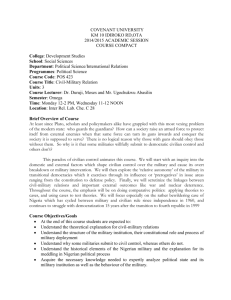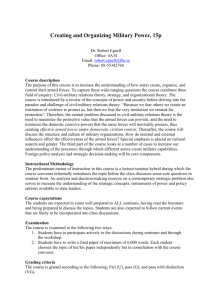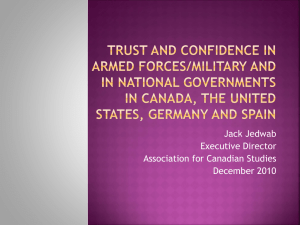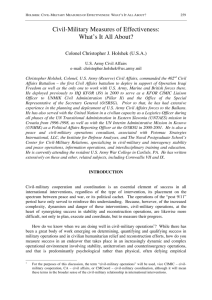Nielsen and Snider, eds. American Civil
advertisement
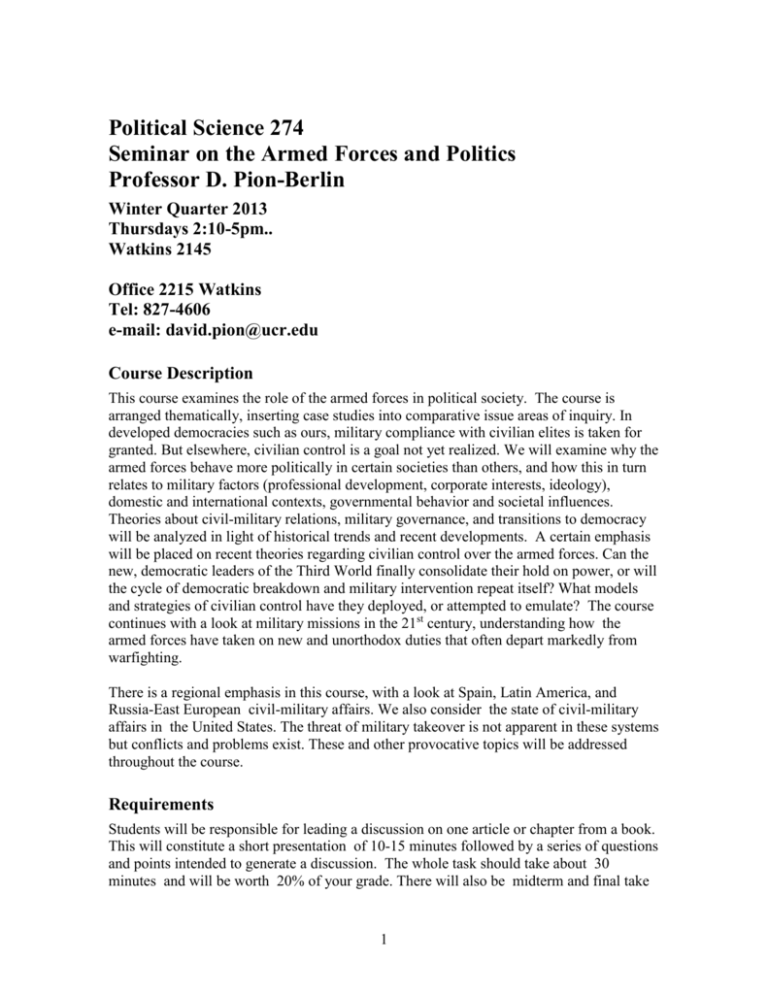
Political Science 274 Seminar on the Armed Forces and Politics Professor D. Pion-Berlin Winter Quarter 2013 Thursdays 2:10-5pm.. Watkins 2145 Office 2215 Watkins Tel: 827-4606 e-mail: david.pion@ucr.edu Course Description This course examines the role of the armed forces in political society. The course is arranged thematically, inserting case studies into comparative issue areas of inquiry. In developed democracies such as ours, military compliance with civilian elites is taken for granted. But elsewhere, civilian control is a goal not yet realized. We will examine why the armed forces behave more politically in certain societies than others, and how this in turn relates to military factors (professional development, corporate interests, ideology), domestic and international contexts, governmental behavior and societal influences. Theories about civil-military relations, military governance, and transitions to democracy will be analyzed in light of historical trends and recent developments. A certain emphasis will be placed on recent theories regarding civilian control over the armed forces. Can the new, democratic leaders of the Third World finally consolidate their hold on power, or will the cycle of democratic breakdown and military intervention repeat itself? What models and strategies of civilian control have they deployed, or attempted to emulate? The course continues with a look at military missions in the 21st century, understanding how the armed forces have taken on new and unorthodox duties that often depart markedly from warfighting. There is a regional emphasis in this course, with a look at Spain, Latin America, and Russia-East European civil-military affairs. We also consider the state of civil-military affairs in the United States. The threat of military takeover is not apparent in these systems but conflicts and problems exist. These and other provocative topics will be addressed throughout the course. Requirements Students will be responsible for leading a discussion on one article or chapter from a book. This will constitute a short presentation of 10-15 minutes followed by a series of questions and points intended to generate a discussion. The whole task should take about 30 minutes and will be worth 20% of your grade. There will also be midterm and final take 1 home exams handed out in weeks five and ten, based on materials from the course. Students will have 72 hours to complete the exam and each will be worth 30% of the grade. The final 20% will be based on regular contributions to class discussion. This last requirement is taken seriously. You are in graduate school now, and are expected to contribute to discussions in class on the materials covered. Readings There are five required books, four of which that must be purchased, listed below Books Peter Feaver. Armed Servants: Agency, Oversight and Civil-Military Relations. Harvard U. Press, 2003. David Pion-Berlin, Civil-Military Relations in Latin America: New Analytical Perspectives. Chapel Hill: University of North Carolina Press, 2001. (Do not purchasewill be handed out in class). Narcis Serra, The Military Transition: Democratic Reform of the Armed Forces. Cambrdige U. Press, 2010. Brian Taylor. Politics and the Russian Army: Civil-Military Relations, 1689-2000. Cambridge U. Press, 2003. Suzanne Nielsen and Don Snider, eds. American Civil-Military Relations: The Soldier and the State in a New Era. Johns Hopkins Press, 2009. In addition, there are article length readings assigned. Some of these have already been placed on e-reserve for you at Rivera library, and in time the rest will be as well. Go online to the library webpage, click on reserve services, type in my name and you will see the list of readings. The password is “civmil.” The titles of readings on this syllabus should match the titles listed on reserve in most cases. Books have also been placed on regular reserve (*). If a chapter cannot be found on e-reserve, it means it can be found within the books on reserve. Syllabus Week One Conceptualizing the Armed Forces S. Huntington, “Officership as a Profession,” 7-18; M. Janowitz, “Professionals in Violence;” A. Perlmutter and V. Bennett, “the Praetorian Army and the Praetorian State,” pp. 199-211; E. Nordlinger, “A Political Sociology of the Officer Corps,” 31-49; Alfred Stepan, “The New Professionalism” C. Moskos, “Institutional and Occupational Trends in Armed Forces.” Background Reading Samuel Huntington, The Soldier and the State: The Theory and Politics of Civil-Military Relations (Harvard U. Press, 1957)*; Morris Janowitz, The Professional Soldier: A Social and Political Portrait (The Free Press, 1960)*; S.E. Finer, Man on Horseback: The Role of 2 the Military in Politics (Westview, 1988)*; Eric Nordlinger, Soldiers in Politics: Military Coups and Governments (Prentice-Hall, 1977)*; Bengt Abrahamsson, Military Professionalism and Political Power (Sage 1972); Timothy J. Colton Commisars, Commanders, and Civilian Authority: The Structure of Soviet Military Politics (Harvard 1979). Week Two Classic Theorizing on Civil-Military Relations S. Huntington, “Power, Professionalism and Ideology;” S. E. Finer. “The Military in the Politics of Today;” Lowenthal and Fitch, Armies and Politics* pp. 96- 166; Nordlinger, “the Coup D’Etat;” 63-107 Background Readings Eric Nordlinger, Soldiers in Politics; Alfred Stepan, The Military in Politics: Changing Patterns in Brazil (Princeton 1971); Guillermo O’Donnell, Modernization and Bureaucratic-Authoritarianism (Berkeley: Institute for International Studies, 1973); J. Samuel Fitch and Abraham Lowenthal, Armies and Politics in Latin America (Holmes and Meier, 1986); Peter Feaver, “The Civil-Military Problematique: Huntington, Janowitz, and the Question of Civilian Control,” Armed Forces & Society 23,2 Winter 1996. Week Three New Theorizing on Civil-Military Relations: Overviews and Rational Choice Approaches D. Pion-Berlin, Civil-Military Relations in Latin America, pp. 9-58; B. Taylor, Politics and the Russian Army, chpt. 1; P. Feaver, Armed Servants, 1-95; 283-302 (you can skim rest of book) Background Reading Thomas Sowers, “Beyond the Soldier and the State” Armed Forces & Society 31,3 Spring 2005: 385-409; P. Feaver, “The Civil-Military Problematique: Huntington, Janowitz, and the Question of Civilian Control,” Armed Forces & Society 23,2 (Winter 1996): 149-78; Wendy Hunter, Eroding Military Influence in Brazil: Politicians Against Soldiers (University of North Carolina Press, 1997; Muthiah Alagappa, Coercion and Governance: The Declining Political Role of the Military in Asia (Stanford: Stanford University Press, 2001; Week Four New Theorizing, cont’d: The Structural and Institutional Approaches Michael Desch. Civilian Control of the Military: The Changing Security Environment, Chapters 1 and 2; Paul Staniland, “Explaining Civil-Military Relations in Complex Political Environments: India and Pakistan” Security Studies 17:322-362. Pion-Berlin and Arceneaux , “Decision-makers or Decision-Takers?” Armed Forces and Society 26,3; (Spring 2000):413-436 3 Background Reading Michael Desch. Civilian Control of the Military: The Changing Security Environment. Johns Hopkins U. Press, 1999; ); Deborah Avant. Political Institutions and Military Change: Lessons from Peripheral Wars. Cornell, 1994; David Pion-Berlin. Through Corridors of Power: Institutions and Civil-Military Relations in Argentina. Penn State Press, 1997; S. Huntington, ed. Changing Patterns in Military Politics. Free Press, 1962; Harold Lasswell, “The Garrison State,” American Journal of sociology. 46,4 (1941):45568; On threat environments and effects on military, see Joao Resende-Santos Neorealism, States, and the Modern Mass Army. Cambridge U. Press, 2007; On internal threats and military responses, see A. Stepan, “the New Professionalism,” and G. O’Donnell, “Modernization and Military Coups;” Both in Lowenthal and Fitch,eds.Armies and Politics in Latin America. Week Five The Military and Authoritarian State Power Eric Nordlinger, “Officers as Governors;” 109-147; Karen Remmer, Military Rule in Latin America, 3-45; Barbara Geddes, “What Do We know About Democratization After Twenty Years?,” Annual Review of Political Science, 1999, 2:115-44; Craig Arceneaux, “Introduction: An Institutional Approach to Military Rule and Transition Control.” Background Reading Karen Remmer, Military Rule in Latin America (whole book) (Unwin Hyman 1989); Harold Crouch, The Army and Politics in Indonesia (Cornell, 1978); Samuel DeCalo, Coups and Army Rule in Africa: Motivations and Constraints (Yale, 1990); Guillermo O’Donnell, Modernization and Bureaucratic Authoritarianism (Institute of International Studies, 1973); Robert Barros, Constitutionalism and Dictatorship: Pinochet, the Junta and the 1980 Constitution (Cambridge, 2002); William Stanley, The Protection Racket State: Elite Politics, Military Extortion and Civil War in El Salvador (Temple U. Press, 1996). Mary Callaghan, Making Enemies: War and State-Building in Burma (Cornell, 2003). Take Home Midterm – due back in 72 hours. Week Six The Military and Democratic Transitions: Theory and Case Study of Spain. Narcis Serra. The Military Transition: Democratic Reform of the Armed Forces. Read whole book. Background Reading Zoltan Barany. The Soldier and the Changing State: Building Democratic Armies in Africa, Asia, Europe, and the Americas (Princeton, 2012); Felipe Aguero, Soldiers, Civilians and Democracy: Post-Franco Spain in Comparative Perspective (Johns Hopkins, 1995); Stepan. Rethinking Military Politics: Brazil and the Southern Cone. Princeton Press, 1988; C. Moskos, “Institutional/Occupational Trends in Armed Forces: AnUpdate,” Armed Forces & Society 12,3, Spring 1986; Pion-Berlin, “The Political Management of 4 the Military in Latin America,” Military Review. January-February, 2005: 19-31; Thomas Bruneau, “Civil-Military Relations in Latin America: The Hedgehog and Fox Revisited,” Revista Fuerzas Armadas y Sociedad. 19, 1, 2005: 111-131. Week Seven Democratic Civilian Control: What Does it Take? Bruneau and Tollefson. Who Guards the Guardians and How* Preface, Intro, Chpts. 1-4, 6-7, Conclusion; Andrew Cottey et al, “The Second Generation Problematic: Rethinking Democracy and Civil-Military Relations” Armed Forces & Society, 29,1 Fall 2002: 31-56; D. Pion-Berlin, “Defense Organization and Civil-Military Relations in Latin America,” Armed Forces and Society, 35,3 (April 2009) :562-86. Background Reading Chris Gibson and Don Snider, “ Civil-Military Relations and the Potential to Influence: A Look at National Security Decision-Making Process,” Armed forces & Society, 25,2 (Winter 1999): 193-218; Martin Edmonds. Central Organizations of Defense. Westview, 1985; Michael J. Hogan; Hans Born, Philipp Flury, and A. Johnson, eds. Parliamentary Oversight of the Security Sector. Geneva: Centre for the Democratic Control of the Armed Forces; Andrew Cottey, et al. Democratic Control of the Military in Postcommunist Europe: Guarding the Guards; Pion-Berlin, Civil-Military Relations, Chapt. 6. Week Eight Civil-Military Relations in Latin America D. Pion-Berlin, Civil-Military Relations in Latin America, pp. 59-274. Pion-Berlin and Trinkunas, Civilian Praetorianism and Military Shirking During Constitutional Crises in Latin America,” Comparative Politics July 2010. Background Reading: Frederick Nunn, Yesterday’s Soldiers: European Military Professionalism in South America (U. Nebraska 1983); Brian Loveman and Thomas Davies, The Politics of AntiPolitics: The Military in Latin America (Scholarly Resources 1997); Alain Rouquié The Military and the State in Latin America (Berkeley, 1987); David Pion-Berlin, Through Corridors of Power: Institutions and Civil-Military Relations in Argentina (Penn State 1997); J. Samuel Fitch. The Armed Forces and Democracy in Latin America. Johns Hopkins Press, 1998; Deborah Norden, Military Rebellion in Argentina: Between Coups and Consolidation (U. Nebraska, 1995). Week Nine Civil-Military Relations in Russia: An Organizational-Cultural Approach Brian Taylor, Politics and the Russian Army, reread ch.1, pp. 138-340 Background Reading 5 Roman Kolkowicz. The Soviet Military and the Communist Party (Princeton, 1967); Timothy J. Colton Commisars, Commanders, and Civilian Authority: The Structure of Soviet Military Politics (Harvard 1979); Dale R. Herspring. Russian Civil-Military Relations (Indiana University Press, 1996); Zoltan Barany. Democratic Breakdown and the Decline of the Russian Military. Princeton University Press. 2007; Dale Herspring, Samuel Huntington and Communist Civil-Military Relations,” Armed Forces & Society 25,4 (Summer 1999). Week Ten U.S. Civil-Military Relations Nielsen and Snider, eds. American Civil-Military Relations: The Soldier and the State in a New Era. Background Reading D. Snider, and M. Carlton-Carew, eds. U.S. Civil-Military Relations: In Crisis or Transition ?; P. Feaver and R. Kohn, eds. Soldiers and Civilians: The Civil-Military Gap and American National Security; “A Symposium on Civil-Military Relations,” Armed Forces & Society 24,3 (Spring 1998); Ole R. Holsti "A Widening Gap between the U.S. Military and Civilian Society? Some Evidence, 1976-96 International Security 23 (Winter 1998-99):. Samuel Huntington, The Soldier and the State, Parts II and III; David Hendrickson, Reforming Defense: The State of American Civil-Military Relations (Johns Hopkins 1988); Richard H. Kohn, ed. The U.S. Military Under the Constitution of the United States, 1789-1989 (New York University Press 1991). C. Gibson and D. Snider, “Civil-Military Relations and the Potential to Influence: A Look at the National Security Decision-Making Process,” Armed Forces and Society, 25 (Winter 1999). Take Home Final - due back in 72 hours. 6
